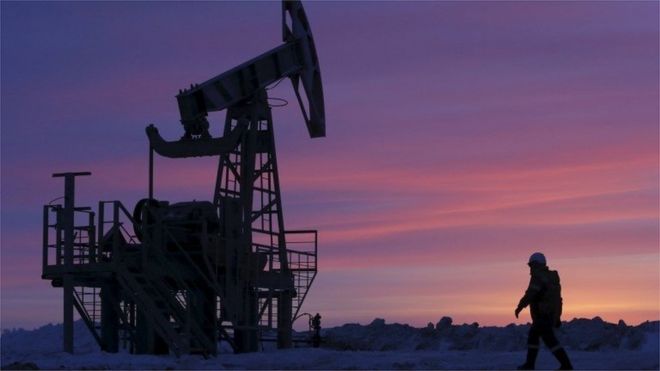Oil price falls as Iran rejects output freeze deal

Oil prices have fallen by nearly 3% after Iran put off plans to join nations proposing a freeze on production.
Oil minister Bijan Zanganeh said Iran would only join discussions to cap output after its production reached four million barrels per day.
In February, Saudi Arabia struck a deal with Russia and other Opec nations to freeze oil output at January levels.
But Iran wants production to hit pre-sanction levels before beginning talks.
At the weekend, Mr Zanganeh said: “I have already announced my view regarding the oil freeze and I’m saying now that as long as we have not reached four million in production, they should leave us alone.
“When we reach this level of production, we can then co-operate with them.”
In its monthly oil market report published on Monday, Opec said Iran produced 3.1 million barrels per day in February, a rise of 187,000 barrels on the previous month.
Surplus woes
Brent crude prices fell 2.7% to $39.32. Oil recently rose above $40 per barrel for the first time this year.
Prices have sunk nearly 70% since reaching a $115 a barrel in June 2014.
However, Opec, the cartel of oil-producing nations, has refused to cut make significant cuts to output amid a slowdown in demand from large industrial countries such as China, coupled with the shale energy boom in the US.
In its most recent report, Opec said its output slowed marginally in February, by 175,000 barrels per day to 32.38 million, on lower production from Iraq, Nigeria and the United Arab Emirates.
Overall, it expects demand for 2016 to reach 31.5 million barrels per day, a fall of 100,000 barrels on its previous forecast, but a rise of 1.8 million barrels per day on last year.
Bjarne Schieldrop, chief commodities analyst at SEB Markets in Oslo, said a two million barrel-per-day surplus in oil supplies would continue to weigh on prices in the short term.
“We are likely to see $35 a barrel before we see $45 a barrel,” he said.
Russia’s energy minister, Alexander Novak, who met Mr Zanganeh in Tehran on Monday to discuss a separate oil and gas swap deal, was quoted as saying “Major oil producers shall co-ordinate with each other.
“However, since Iran’s production decreased under sanctions, we totally understand Iran’s position to increase production and revive its share in the global markets.”
[Source:- BBC]